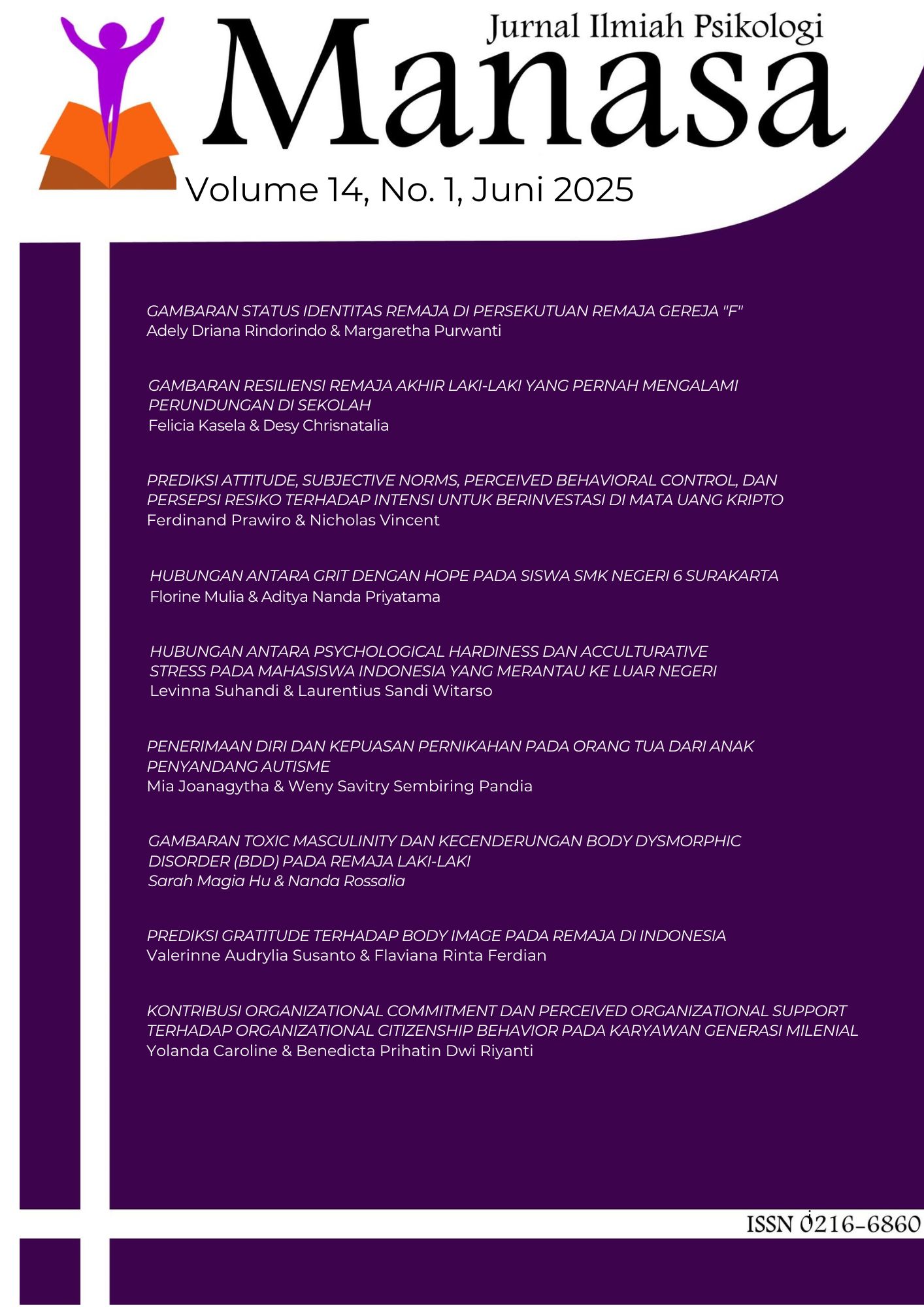Hubungan Antara Psychological Hardiness dan Acculturative Stress pada Mahasiswa Indonesia yang Merantau ke Luar Negeri
DOI:
https://doi.org/10.25170/manasa.v14i1.6660Keywords:
acculturative stress, psychological hardiness, international students, thesisAbstract
Indonesian students studying abroad often face various challenges during their adaptation process, which can lead to acculturative stress. Psychological hardiness is a key factor that may help reduce this stress. It is a personality trait that enables individuals to cope with stress by viewing challenges as opportunities for growth and maintaining commitment and control in difficult situations. This study aimed to examine the relationship between psychological hardiness and acculturative stress among Indonesian students abroad. A quantitative method with correlational analysis was used, involving 140 Indonesian students who had been studying abroad for no more than two years as of October 2024. Data were collected using the Hardiness Scale and the Acculturative Stress Scale for International Students (ASSIS). The results revealed a negative correlation (-.313) between psychological hardiness and acculturative stress. Specifically, the control (-.358) and challenge (-.321) dimensions of psychological hardiness were also negatively correlated with acculturative stress. These findings suggest that students with higher psychological hardiness perceive themselves as capable of managing their environment and see change as a positive experience, which reduces stress. Future research is recommended to further explore the role of psychological hardiness in reducing acculturative stress among international students.
References
Abid, S., Bajwa, R. S., Batool, I., & Amjad, A. (2019). Interaction of cultural intelligence, psychological hardiness and academic performance with homesickness among hostel students. Pakistan Journal of Social Sciences, 39(1), 179-188. https://prdb.pk/article/the-interaction-of-cultural-intelligence-psychological-hard-4354
Adilah, M. A., & Widiasih, P. A. (2023). Gambaran makna happiness pada mahasiswa perantau di luar negri. Journal of Indonesian Psychological Science, 3(2), 442—455. https://doi.org/10.18860/jips.v3i2.22850
Alsaqr, A. M. (2021). Remarks on the use of Pearson’s and Spearman’s correlation coefficients in assessing relationships in ophthalmic data. African Vision and Eye Health, 80(1), 1-10. https://doi.org/10.4102/aveh.v80i1.612
Atri, A., Sharma, M., & Cottrell, R. (2007). Role of social support, hardiness, and acculturation as predictors of mental health among international students of asian indian origin. International Quarterly of Community Health Education, 27(1), 59–73. https://doi.org/10.2190/iq.27.1.e
Christianto, L. P. & Amalia, S. R. (2022). Penyusunan alat ukur hardiness untuk individu pada tahap perkembangan dewasa awal. Seminar Nasional Psikologi dan Ilmu Humaniora (SENAPIH), 1(1), 132-141. https://conference.um.ac.id/index.php/psi/article/view/2937
Creswell, J. W. (2015). Educational research: Planning, conducting, and evaluating quantitative and qualitative research (Fifth edition). Nebraska: Pearson.
Crocker, L. & Algina, J. (2008). Introduction to classic and modern test theory. Ohio: Cengage Learning.
Delahaij, R., Gaillard, A. W. K., & van Dam, K. (2010). Hardiness and the response to stressful situations: Investigating mediating processes. Personality and Individual Differences, 49(5), 386–390. https://doi.org/10.1016/j.paid.2010.04.002
Drogendijk, R., & Slangen, A. (2006). Hofstede, Schwartz, or managerial perceptions? The effects of different cultural distance measures on establishment mode choices by multinational enterprises. International Business Review, 15(4), 361–380. https://doi.org/10.1016/j.ibusrev.2006.05.003
Emerson, R. W. (2023). Regression an effect size. Journal of Visual Impairment & Blindness, vol. 117(2), 191‐192. https://doi.org/10.1177/0145482X231166596
Feba, T. & Sumathi, G. N. (2018). Length of stay and acculturative stress of international students empirical study. International Journal of Pure and Applied Mathematics, 120(6), 10253-10264. http://www.acadpubl.eu/hub/
Gebregergis, W. (2018). Major causes of acculturative stress and their relations with sociodemographic factors and depression among international students. Open Journal of Social Sciences, 6(10), 68-87. https://doi.org/10.4236/jss.2018.610007
Guilford, J. P. (1956). Fundamental statistics in psychology and education. McGraw-Hill.
Handayani, P. G., & Febriani, R. D. (2017). Dealing with culture shock for immigrant students. Proceedings International Counseling and Education Seminar: The Responsibility of Counselor and Educator in Millennium Era, 98-101. http://repository.unp.ac.id/id/eprint/11207
Iorga, M., Soponaru, C., Muraru, I.-D., Socolov, S., & Petrariu, F.-D. (2020). Factors associated with acculturative stress among international medical students. BioMed Research International, 2020, 1–9. https://doi.org/10.1155/2020/2564725
Jameson, P. R. (2014). The effects of a hardiness educational intervention on hardiness and perceived stress of junior baccalaureate nursing students. Nurse Education Today, 34(4), 603-607. https://doi.org/10.1016/j.nedt.2013.06.019
Johnson, L. R., Seifen-Adkins, T., Sandhu, D. S., Arbles, N., & Makino, H. (2018). Developing culturally responsive programs to promote international student adjustment: A participatory approach. Journal of International Students, 8(4), 1865–1878. https://doi.org/10.5281/zenodo.1468100
Judkins, J. L., Moore, B. A., & Colette, T. Y. (2020). Psychological hardiness. Abingdon, 1-14. https://doi.org/10.4324/9780367198459-REPRW120-1
Kanekar, A., Sharma, M., & Atri, A. (2010). Enhancing social support, hardiness, and acculturation to improve mental health among asian indian international students. International Quarterly of Community Health Education, 30(1), 55–68. https://doi.org/10.2190/iq.30.1.e
Karuppan, C. M., & Barari, M. (2010). Perceived discrimination and international students’ learning: an empirical investigation. Journal of Higher Education Policy and Management, 33(1), 67–83. https//doi.org/10.1080/1360080x.2011.537013
Keo, J. J., Kristinawati, W., & Setiawan, A. (2020). Dukungan sosial, ketangguhan pribadi, dan stres akulturasi mahasiswa Nusa Tenggara Timur di Salatiga. Psikologika, 25(1), 15-28. https://doi.org/10.20885/psikologika.vol25.iss1.art2
Kim, B. H., & Suh, K. H. (2021). The relationships between hardiness and life satisfaction or expectation of korean multicultural children: Focused on mediating effect of acculturative stress moderated by resilience. Frontiers in Psychology, 12. https://doi.org/10.3389/fpsyg.2021.663134
Kristiana, I. F., Karyanta, N. A., Simanjuntak, E., Prihatsanti, U., Ingarianti, T. M., & Shohib, M. (2022). Social support and acculturative stress of international students. International Journal of Environmental Research and Public Health, 19(11), 6568. https://doi.org/10.3390/ijerph19116568
Kusek, W. A. (2015). Evaluating the struggles with international students and local community participation. Journal of International Students, 5(2), 121-131. https://doi.org/10.32674/jis.v5i2.429
Liu, D. W., & Winder, B. (2015). Exploring foreign undergraduate students’ experiences of university. International Journal of Qualitative Studies in Education, 27(1), 42-64. http://dx.doi.org/10.1080/09518398.2012.736643
Maddi, S. R. (2015). Personal Views Survei II: A measure of dispositional hardiness. Consulting Psychology Journal, 54(3), 175-185. https://doi.org/10.1037/1061-4087.54.3.173
Manning, M. R., Williams, R. F., & Wolfe, D. M. (1988). Hardiness and the relationship between stressors and outcomes. Work & Stress, 2(3), 205–16. https://doi.org/10.1080/02678378808259168
Manz, S., (2003). Culture Shock - Causes, Consequences and Solutions: The International Experience, Munich: GRIN Verlag. https://www.grin.com/document/108360
Marietha, A. R. (2024). Mahasiswa Indonesia yang belajar di luar negeri terbanyak kedua di ASEAN. GoodStats. https://goodstats.id/article/keren-jumlah-mahasiswa-indonesia-belajar-di-luar-negeri-terbanyak-kedua-di-asean-0t504
Maulida, R., Imadduddin, & Fadhila, M. (2022). Gambaran kebersyukuran mahasiswa perantau di luar negeri (studi pada mahasiswa muslim asal indonesia yang kuliah di luar negeri). Jurnal Al Husna, 3(3), 200-210. https://doi.org/10.18592/jah.v3i3.4516
Miller L. A. & Lovler, L. R. (2020). Foundations of psychological testing: A practical approach (6th edition). California: Sage Publication. ISBN: 987-1-5063-9640-8
Mund, P. (2016). Kobasa concept of hardiness (A study with reference to the 3Cs). International Research Journal of Engineering, IT & Scientific Research, 2(1), 34-40. https://sloap.org/journals/index.php/irjeis/article/view/243/769
Ng, S. M., & Lee, T. M. C. (2019). The mediating role of hardiness in the relationship between perceived loneliness and depressive symptoms among older. Aging and Mental Health, 24(5), 805–810. https://doi.org/10.1080/13607863.2018.1550629
Oberg, K. (1960). Cultural Shock: Adjustment to New Cultural Environments. Practical Anthropology, os-7(4), 177–182. https://doi.org/10.1177/009182966000700405
Oral, M. & Karakurt, N. (2022). The impact of psychological hardiness on intolerance of uncertainty in university students during the COVID‐19 pandemic. Community Psychology, 50(8), 3574–3589. https://doi.org/10.1002/jcop.22856
Rajab, A., Rahman, H. A., Panatik, S. A., & Mansor, N. S. (2014). Acculturative stress among international students. Journal of Economics, Business and Management, 2(4), 262-265. https://doi.org/10.7763/JOEBM.2014.V2.136
Ren, Q. & Jiang, S. (2021). Acculturation stress, satisfaction, and frustration of basic psychological needs andmental health of chinese migrant children: Perspective from basic psychological needs theory. Internataional Journal of Environmental Research and Public Health, 18(9), 4751. https://www.ncbi.nlm.nih.gov/pmc/articles/PMC8124301/#B20-ijerph-18-04751
Sandhu, D. S. & Asrabadi, B. R. (1994). Development of an acculturative stress scale for international students: Preliminary findings. Psychological Reports, 75(2), 435-448. https://doi.org/:10.2466/pr0.1994.75.1.435
Sandhu, D. S. & Asrabadi, B. R. (1998). An acculturative stress scale for international students: A practical approach to stress management. Evaluating stress: A book of resources, 2(1-33).
Shan, C., Hussain, M., Sargani, G. R. (2020). A mix-method investigation on acculturative stress among pakistani students in china. PLoS ONE, 15(10): e0240103. https://doi.org/10.1371/journal. pone.0240103
Soemantri, N. P. (2019). Adaptasi budaya mahasiswa asal indonesia di australia. Wanaca Jurnal Ilmiah Ilmu Komunikasi, 18(1), 46-56. https://journal.moestopo.ac.id/index.php/wacana/article/view/727/457
Sugianto, D. & Liem, A. (2024). Reliability and validity of the indonesian version of the dual filial piety scale. Jurnal Psikologi Ulayat, 11(1),109-121. https://doi.org/10.24854/jpu839
Sullivan, C. & Kashubeck-West, S. (2015). The interplay of international students’ acculturative stress, social support, and acculturation modes. Journal of International Students, 5(1), 1-11. https://www.scirp.org/reference/referencespapers?referenceid=2379526
Talwar, P., Rethinasamy, S., Abd Ghani, K., Tan, K. W., & Mat Yusoff, N. F. (2022). Sociodemographic determinants of acculturation stress among international university students. EDUCATUM Journal of Social Sciences, 8(1), 23–30. https://doi.org/10.37134/ejoss.vol8.1.3.2022
Tartakovsky, E. (2007). A longitudinal study of acculturative stress and homesickness: high-school adolescents immigrating from Russia and Ukraine to Israel without parents. Social Psychiatry and Psychiatric Epidemiology, 42(6), 485-94. https://doi.org/10.1007/s00127-007-0184-1.
Vinothkumar, M., Vinu, V., & Anshya, R. (2013). Mindfulness, hardiness, perceived stress among engineering and BDS students. Indian Journal of Positive Psychology, 4(4), 514-517. http:/ /www. iahnv. coni / index . php /liome/joumal _ dctail 19# lis
Ward, C. & Geeraert, N. (2016). Advancing acculturation theory and research: the acculturation process in its ecological context. Current Opinion in Psychology, 8, 98-104. https://doi.org/10.1016/j.copsyc.2015.09.021
Wu, E. W., Hagan, M. J., Eschleman, K., & Gard, D. E. (2024). Hardiness predicts mental health recovery during the COVID-19 pandemic. Psychological Trauma: Theory, Research, Practice, and Policy. Advance online publication. https://doi.org/10.1037/tra0001660
Yakunina, E. S., Weigold, I. K., Weigold, A., Hercegovac, S., & Elsayed, N. (2013). International students’ personal and multicultural strengths: Reducing Acculturative Stress and Promoting Adjustment. Journal of Counseling & Development, 91(2), 216–223. https://doi.org/10.1002/j.1556-6676.2013.00088.x
Yang, B., Guan, Q., Huang, J., & Wang, Z. (2022). Peer victimization and nonsuicidal self-injury among chinese left-behind children: mediation by perceived discrimination and moderation. Hardiness. Journal of Aggression, Maltreatment and Trauma, 32(5), 709–725. https://doi.org/10.1080/10926771.2022.2101408
Ying, Y. W. (2005). Variation in acculturative stressors over time: A study of Taiwanese students in the United States. International Journal of Intercultural Relations, 29(1), 59-71. https://doi.org/10.1016/j.ijintrel.2005.04.003
Zhang, Y. & Jung, E. (2017). Multi dimensionality of acculturative stress among chinese international students: What lies behind their struggles? International Research and Review, 7(1), 23-43. https://files.eric.ed.gov/fulltext/EJ1170666.pdf
Zhang, Y., Li, Y., Frost, M., Rong, S., Jiang, R., & Cheng, E. T. C. (2021). The impact of organizational position level and cultural flow direction on the relationship between cultural intelligence and expatriate cross-border adaptation. Cross Cultural & Strategic Management, 28(2), 332–367. https://doi.org/10.1108/CCSM-01-2020-0012
Downloads
Published
Issue
Section
License
Copyright (c) 2025 MANASA

This work is licensed under a Creative Commons Attribution-NonCommercial-ShareAlike 4.0 International License.









.png)
.png)

